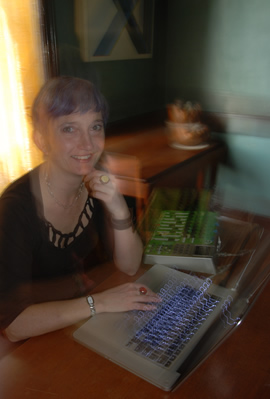
UnTwelve is happy to present this interview with Soressa Gardner who took home 2nd prize in our 2010 composition competition for her piece Mayne at midnight, which was heard for the first time at the winner's "dark concert" on Jan. 29th.
Soressa is a vocalist, improviser and electronic music composer who collaborates with authors (Dennis E, Bolen, Evie Christie), Dancers (BODAC) Visual artists (Birdwise, Ballesteros) And a range of musicians. Her work has been performed at Vancouver New Music Festival 2010, The Western Front and Rutgers University-Camden. She hold a music degree from Vancouver Community College.
UnTwelve: Can you tell us a little bit about your musical background?
SG: My first connection with music was as a singer. For many years I relied on others to interpret my intentions and create music around my melodies. I had some excellent musicians at hand, so that sufficed for a long time. I was well into my 30s before I decided to pursue a music degree, beginning with a diploma in classical voice. I started taking electronic music electives with an excellent Canadian composer, Peter Hannan, and from there I discovered my interest in creating sound worlds using electronic instruments. I finished my degree specializing in electronic music composition and classical voice—an unlikely but useful combination.
UnTwelve: When did you discover tuning and microtones as an interesting dimension to use in your composing? What draws you to it?
SG: Again, it was in school, from a few different directions. I played in a Sundanese Gamelan ensemble because I love the dreamy quality of their music, though my facility as player is limited. In electronic music studies we looked into taking advantage of employing different tunings as part of our composition strategies. I love that "beating" sound that occurs when two instruments are just the right amount "out of tune". And different tunings bring different emotional energies to music.
UnTwelve: Tell us a little bit about your process in general, and in particular for your entry piece. What does 'technique' mean to you? Are there any ways you tend to find inspiration?
SG: Improvisation in conjunction with a few constraints often helps me find a starting point. For this piece, once I'd decided on the Gamelan tuning, I experimented with a few rhythms and effects until I had small building blocks to combine in different ways. Then I looked for complimentary instruments outside the Gamelan family and applied the tuning script to them. Unless I am working on an extended piece--exceeding, say, 15 minutes--I don't tend to pre-plan the structure. I let the music unfold, and once I have enough material I do a lot of editing to tighten up the structure. I look to a number of different programs for effects and processing the sounds and that often leads me in unexpected directions.
UnTwelve: Do you have any upcoming projects you are excited to share?
SG: Yes, my husband Dennis E. Bolen is a fiction writer and over the past year or so we have been combining our talents to create live spoken word and music presentations, sometimes with visuals. We are currently working up a new piece for the launch of his latest book, Anticipated Results, in the spring.
UnTwelve: How do you characterize the current music scene as you see it? What are its strengths and weaknesses?
SG: I see it through the eyes of a Canadian composer/performer with an interest in electronic music, so that narrows the field a fair bit. I live in Vancouver, BC and we have a vibrant improvised music scene with a strong sense of community. We have the New Orchestra Workshop (NOW) that has promoted improvised music for the past 30 years and brings like-minded people together with free workshops. I also play in the Vancouver Electronic Music Ensemble (VEE), which just formed last year. In both groups, people take it for granted that different tonalities emerge when composing in the moment. The music is richer for it, and much of my desire to compose grows from the energizing experience of making music with these talented musicians. What is lacking in Vancouver is affordable venues. Various festivals help alleviate the problem, but it is hard to build audiences without regular venues. Our liquor laws as they pertain to live music are very restrictive and have been the demise of some excellent and supportive venues. But that's a whole other interview. Suffice to say, Vancouver is rich with innovative musicians and composers, and I'm fortunate to be a part of the scene.